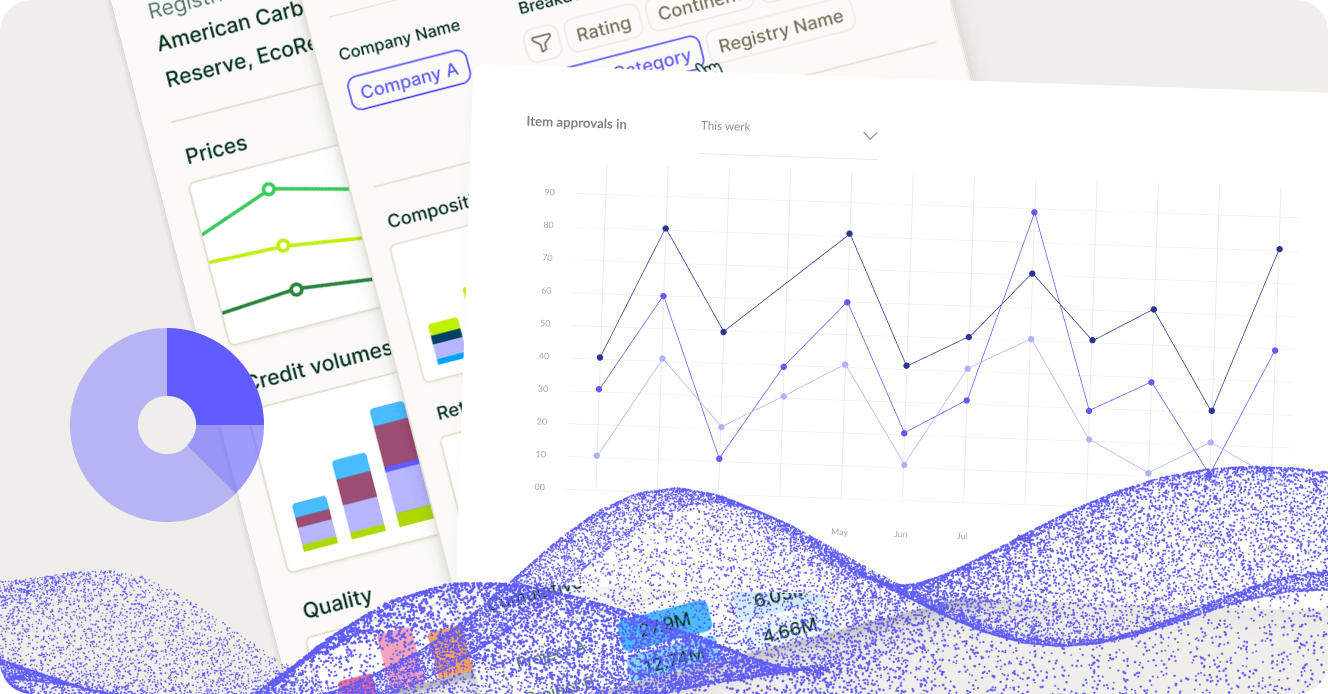“Over the years we’ve invested significantly in our field data team - focusing on producing trusted ratings. While this ensures the accuracy of our Ratings, it doesn’t allow the scale across the thousands of projects that buyers are considering.”
For more information on carbon credit procurement trends, read our "Key Takeaways for 2025" article. We share five, data-backed tips to improve your procurement strategy.

One more thing: Connect to Supply customers also get access to the rest of Sylvera's tools. That means you can easily see project ratings and evaluate an individual project's strengths, procure quality carbon credits, and even monitor project activity (particularly if you’ve invested at the pre-issuance stage.)
Book a free demo of Sylvera to see our platform's procurement and reporting features in action.
For businesses and investors interested in environmental, social and corporate governance (aka ESG), a word that’s been impossible to escape recently is ‘disclosure’. It’s a word that sparks a lot of questions: what does this actually mean, why is it such a hot topic, and how might it affect businesses and the voluntary carbon market? This blog takes a deep dive into those questions and covers everything we know so far, and what to expect in the future.
What are climate-related disclosures?
Disclosures refer to the information that companies publicly provide about their operations, financial performance, and risks. The purpose is to provide transparency to investors and other stakeholders, so they can make informed decisions about the company. These can include annual reports, financial statements, and disclosures to regulators.
Climate-related disclosures specifically refer to reported information about climate change and environmental impacts. This can include data on a company's greenhouse gas emissions, its exposure to physical and transition risks from climate change, and its strategies for managing these risks and opportunities from a net zero transition.
The importance of disclosures
In an economy rapidly transitioning to climate change and mitigation, information about a company’s climate impacts and risks is essential to assess its long-term viability. Information about a company’s commitment to sustainability also has implications for its reputation - companies demonstrating climate leadership are favored by consumers and investors.
Key initiatives
A number of initiatives provide guidance to regulators about what they should require companies to disclose, or to companies wishing to voluntarily disclose climate-related information.

Why all the attention now?
Work on climate-related disclosures has been ongoing since the 1990s. However, the topic is now receiving more interest than ever before. The last few years have seen leaps forward with the publication of voluntary guidance from the TCFD (Taskforce for Climate-related Financial Disclosures), adoption by regulators in countries across the world, and more and more companies choosing to voluntarily disclose climate-related information.
In the last 12 months, climate-related disclosures have become more relevant to the VCM as guidance has expanded to include requirements to disclose carbon credit activity. The ISSB (international Sustainability Standards Body) published two reporting standards. S2 requires companies to report on their planned use of carbon credits to offset greenhouse gas emissions to achieve any net greenhouse gas emissions target. This guidance has been incorporated into the CDP’s reporting template, and regulators such as Singapore have signaled their intent to adopt this guidance into regulation. Elsewhere, regulators in a number of jurisdictions, including the EU and California, are expanding climate-related disclosure rules to include carbon market activity. Meanwhile, the US SEC (Securities and and Exchange Commission) is still considering draft rules.
Timeline

An international overview
Initiatives such as ISSB aim to bring international alignment and facilitate interoperability for transnational companies. Bear in mind that companies operating in these jurisdictions are often covered by this legislation, even if they are based elsewhere. In the transition period as countries consider these guidelines and go through the process of bringing them into law, each country has different requirements. So what is the state of play in key jurisdictions across the world?
US
There is not yet national-scale regulation requiring climate-related financial disclosures in the US. Upcoming SEC regulation will require some form of disclosure but the scope and timing is not yet known. Individual states, especially California, are developing regulation that is likely to cover a large number of companies.
SEC Enhancement and Standardization of Climate-Related Disclosures
What?
In 2022 the SEC proposed standardized rules, but these were met with resistance from some businesses and politicians concerned about the burden to companies.
When?
The SEC has been due to publish a final rule for several months, but we do not yet know when to expect it nor what it will say, although we expect its scope will be more limited than initially proposed.
California Assembly Bill 1305
What?
Climate-related disclosures are included in both recent Senate Bills 253 and 261, but of particular interest is Assembly Bill 1305 which covers VCM disclosures.
Who?
Companies making claims on the basis of credit use, as well as companies marketing or selling credits, have to report on the credits and their underlying attributes such as the standard and methodology used. It is not yet clear exactly the scope of coverage of the law, as it does not define exactly what it means to ‘operate’ or ‘make claims’ in California. Violations carry penalties of $2,500 per day up to a maximum of $500,000.
When?
The law will come into effect from January 1, 2024 and covers any companies that market or sell credits in California.
UK
The UK was a leader in adopting TCFD into formal regulation. However, its disclosure regime does not yet require reporting on carbon market activity. The FCA (Financial Conduct Authority) will consult on updating regulation next year and has signaled that these updates will be aligned with ISSB guidance. The regulation may also possibly expand in line with recent guidance from the TPT (Transition Plan Taskforce) which includes comprehensive disclosure requirements related to carbon credits.
SECR
What?
SECR requires the disclosure of: total energy consumption, scope 1 and 2 emissions, an emissions intensity ratio, efforts taken to improve energy efficiency, and a description of the methodology used to calculate reported metrics.
Who?
All quoted companies in the UK as well as private companies and nonprofits that meet two or more of the following minimum thresholds: 250 employees, £36 million in annual turnover, or an £18 million balance sheet.
When?
The requirement is already in action for about 12,000 firms in the UK. The policy was implemented April 1, 2019.
CRFD
What?
Climate-Related Financial Disclosures (CRFD) is broadly based on TCFD’s framework and requires companies to report on eight considerations around a company’s climate-related risks and opportunities. There is no explicit requirement to disclose carbon emissions, as all companies reporting under CRFD must also report under SECR.
Who?
All UK publicly quoted companies and any UK registered companies with at least 500 employees and £500 million in revenue.
When?
Companies have been required to include this information in annual report filings since April 2023.
EU
The EU has been a first-mover for significant sustainability reporting regulation and typically sets the direction for other global regulatory regimes. Recent focus has been on uniting a fragmentary landscape of different national regulators and pieces of legislation.
There are several pieces of inter-related sustainability legislation moving through the European Parliament currently; the key piece being the CSRD (Corporate Sustainability Reporting Directive). Recent news suggests that some aspects of the ESRS (European Sustainability Reporting Standards) will be delayed by two years, but requirements around VCM disclosures will not be affected.
CSRD
What?
CSRD disclosures will occur alongside annual financial reporting and will be subject to audit assurance. Non-compliance will be addressed through a public denunciation; an order to change conduct; and financial punishment.
CSRD will require companies to disclose more than just scope 1-3 emissions and climate risk, and cover 12 components of ESG outlined in the ESRS. Pillar E1 covers climate change and requires companies to disclose the number of carbon credits purchased and retired for their own operations, as well as throughout the value chain. Project financing deployed to carbon credit projects must also be disclosed. Further disclosures will be required if a company has made a carbon neutrality claim or set a net-zero target, including the credibility and integrity of carbon credits used.
Who?
Over 50,000 companies will be required to report under the CSRD including all public EU-based companies and large EU-based private organizations. The CSRD is also extraterritorial, meaning non-EU domiciled entities with significant operations within the EU will have to comply with certain CSRD disclosure requirements, impacting around 10,000 non-EU firms.
When?
CSRD is already law and is currently being phased in. Entities that have already been subject to the CSRD’s predecessor, Non-Financial Reporting Directive (NFRD), are preparing for their first filings in 2025, using 2024 data. All companies must obtain limited assurance from a third party for their first year of reporting.
Prepare for what’s next
The direction of travel for disclosure regulation is clear. The stringency of sustainability reporting requirements is quickly coming into line with financial reporting. Although there remains some uncertainty around specific provisions and exact timelines, it is prudent for companies to proactively prepare for climate-related disclosure regulations. This can include defining data collection structures and developing reporting processes.
A particular area of increased stringency is the disclosure of VCM activity. The current alphabet soup of voluntary standards and regimes for carbon markets will eventually crystallize into legally enforceable regulatory regimes.
Sylvera has a suite of products that provide organizations with the data and insights necessary to find clarity on carbon credit quality and value. Request a demo here.
Sources:
- Recommendations of the TCFD 2017
- Implementing the Recommendations of the Task Force on Climate-related Financial Disclosures 2021
- CDP climate questionnaire 2022
- CDP will incorporate ISSB guidance from 2024
- IFRS S1 General Requirements for Disclosure of Sustainability-related Financial Information
- IFRS S2 Climate-related Disclosures (Both 2023)















